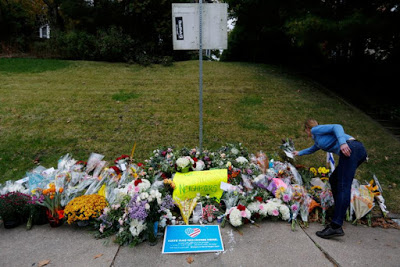Don’t use the murder of my family members to suppress criticism of Israel
 |
| Chad Rosenbloom – January 25, 2019 |
When news started pouring in last October that eleven people were shot and killed in the Tree of Life Synagogue in Pittsburgh, I was preparing to meet some classmates for a study group in Ithaca, New York.
I was raised in the Steel City, and immediately became consumed by the fact that someone I knew was likely connected to the tragedy. It was only later that I found out that two members of my family were murdered in cold blood. They were my second cousins on my mother’s side: Cecil and David Rosenthal.
About a week later I was asked to honor them and the other victims at a candlelight vigil on Cornell University’s Ho Plaza. While grateful for the invitation, I soon realized how the massacre might be appropriated and the memory of the slain tarnished. Some touching words were shared, but the louder voices conveyed the worst tendencies of discourse around anti-Semitism. There was very little self-reflection, no clear universal moral message. Only cursory connections were made to the plight of Black Americans, immigrants, and Muslims. The hysterical allusions to the unique character of Jewish suffering dashed my hopes for catharsis and served as an uncomfortable reminder of the dubious manipulations that would inevitably follow.
What I observed at the vigil would be indicative of how the tragedy came to be framed on a much broader scale. In the same way that the profound horror of the Holocaust has been weaponized in the service of Jewish nationalism, the Pittsburgh massacre would soon be cynically exploited by those who have decided that Palestinian blood is cheap.
Ron Dermer on MSNBC following the killing of 11 Jews at a Pittsburgh synagogue.
Just five months before Robert Bowers brutally extinguished these innocent lives in a place of worship I knew relatively well, Israel was massacring unarmed Palestinians at the Gaza “border” while the body politic largely looked on. Many in the American Jewish community and the corporate media sought to rationalize the mass killing, attributing it to Palestinians’ inherent disregard for their own lives or agitation on the part of Hamas. US officials predictably praised Israeli “restraint” and dismissed the notion that the protests had anything to do with the humanitarian catastrophe in Gaza or the Trump administration’s decision to move the American embassy from Tel Aviv to Jerusalem. For the rest of the world and many Jews of conscience, though, the writing was on the wall. Israel was yet again guilty of a cowardly massacre and should be held accountable.
A promising mechanism for compelling such accountability, a strategy that I wholeheartedly support, is the Boycott, Divestment, and Sanctions (BDS) movement that emerged out of Palestinian civil society in July 2005. Historically boycott initiatives have been powerful tools in the service of social justice, from the Montgomery Bus Boycott that targeted segregation in the Jim Crow South to the Anti-Apartheid Movement that chiseled away at the structure of white supremacy in South Africa. In recent history, New York governor Andrew Cuomo even instituted a boycott of North Carolina in response to discriminatory anti-LGBTQ legislation.
Established Jewish organizations and the Israel lobby have long sought to malign BDS as anti-Semitic. In doing so they have furthered an agenda that is both dangerous to freedom of speech in particular and deleterious of justice and equality more broadly. Already 26 states have passed legislation that penalize boycotting the State of Israel, and 13 more have seen such laws introduced in their legislatures. The ACLU has pointed out that these anti-boycott laws violate the First Amendment and run afoul of the Supreme Court case NAACP v. Claiborne Hardware CO, which specifically affirms the right to engage in political boycotts.
After the massacre at the Tree of Life proponents of these anti-boycott laws wasted no time in attempting to expand their ideological program at the federal level. In doing to so, they displayed a shameful level of political opportunism that is all too common in Zionist apologia. Meanwhile Israeli officials conflated violent anti-Semitism and BDS activism on college campuses, an absurd line of reasoning that belies any actual concern for the lives lost.
There is no denying that anti-Semitism is alive and well, just as there is no denying that Palestinians have suffered under a murderous regime of segregation for over fifty years, claiming untold lives, with no end in sight. White supremacy and xenophobia continue to be palpable forces in American political and social life, and it wouldn’t be a stretch to say that their increasingly mainstream expressions have empowered individuals like Robert Bowers to commit hateful crimes. I say this not to draw false equivalencies, but to bring attention to the fact that the Pittsburgh massacre did not happen in a vacuum.
The congregants that were gunned down in Pittsburgh have something important in common with the protesters gunned down in Palestine: both groups are victims of hateful and dehumanizing iterations of right-wing extremism. The fight against anti-Semitism needs to be waged as part of a larger reckoning with bigotry in all forms or else it is meaningless.
Apartheid Israel, which enjoys virtual impunity due to American diplomatic and military support, should not be exempt from this discussion. Using the deaths of my family members and the nine other victims to suppress criticism of, and activism around, Israeli policy disgraces their memory and obfuscates this essential truth.



